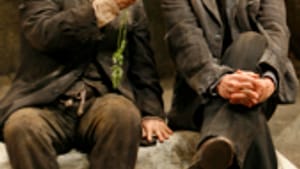Stay in the Loop
BSR publishes on a weekly schedule, with an email newsletter every Wednesday and Thursday morning. There’s no paywall, and subscribing is always free.
Worth the wait
"Waiting For Godot' on Broadway

What a pleasure: The iconic play of the 20th Century treated as living theater, full of people and passion, rather than as a masterpiece to be treated with reverential austerity. This new Broadway production (the first in more than half a century) of Waiting for Godot, under Anthony Page's rollicky direction and with its surprising casting, works by driving home its existential truths with laughter as well as pain.
Two beat-up guys, friends from way back, find themselves— again! (groan)— in the middle of nowhere. Well, where else is there? "Nothing to be done" (the play's tell-all first line) but wait for Godot. While waiting (the better translation of the original French title, En attendant Godot), they do what we all do: They eat and sleep and dream, sing and dance, tell stories, play word games, argue, make up, exercise, chat with passersby, complain (only a little) about their health, try on clothes, and realize, again (groan), that there is nothing to be done.
Boulders and dinge
This production's lack of austerity is visible in its set: a huge bouldery landscape rather than a bare stage, with two exit routes between the giant rocks and a large leafless tree (looking more like a normal tree than the Giacometti tree, a sculpture that disappeared after Godot's first production in Paris).
Everything here is in shades of dinge, including Bill Irwin, who plays Vladimir. His Didi is wan and perfectly forlorn, less dominant intellectually than just half of the Gogo/Didi pair (a pair that may be two halves of one person if you read the play as a monodrama). His face, his hair, his eyes, his clothes— everything is entirely colorless. Irwin is the only renowned Beckett interpreter among the cast of four, and so it's disappointing to note that his is the most self-consciously stylized performance, drawing attention to the rhythmic, grammar-denying delivery we've heard him use before.
Nathan Lane's tragicomic eyebrows have never been so well utilized as they are on Gogo's face, and Lane's portrayal of Estragon is deeply human, needy and conflicted. The comic timing between Lane and Irwin is almost as fine as their tragic timing. (In one dazzling moment Lane, having run amuck with Pozzo's whip, knocks his own hat off, and it sails across the stage; Irwin calmly reaches out an arm and snatches it in mid-air.)
Watching Irwin watch Glover
Enter John Glover as Lucky, the ex-"knook" who used to recite and philosophize and dance— even the fandango!— for his master Pozzo (a caveat to all entertainers who depend on the largesse of their masters). Glover is both shocking and cruelly hilarious with his haunted, hollowed face, his bruised blue eyes, his spectacular drool; his entrance quickly becomes an exit, since the rope around his neck is so long that he's offstage before Pozzo arrives onstage holding the other end. (It is also fascinating to watch Irwin watch Glover, since Irwin played Lucky in the much talked about but little seen Lincoln Center production.) John Goodman is a ludicrously intimidating Pozzo, towering over the other actors, using his great bulk and affected posh speech to lord it over all he surveys.
All told, Beckett's great play endures. As do we all. What more can we ask of a masterpiece than to make us laugh and cry and shake our heads, murmuring, "True, true"? â—†
Two beat-up guys, friends from way back, find themselves— again! (groan)— in the middle of nowhere. Well, where else is there? "Nothing to be done" (the play's tell-all first line) but wait for Godot. While waiting (the better translation of the original French title, En attendant Godot), they do what we all do: They eat and sleep and dream, sing and dance, tell stories, play word games, argue, make up, exercise, chat with passersby, complain (only a little) about their health, try on clothes, and realize, again (groan), that there is nothing to be done.
Boulders and dinge
This production's lack of austerity is visible in its set: a huge bouldery landscape rather than a bare stage, with two exit routes between the giant rocks and a large leafless tree (looking more like a normal tree than the Giacometti tree, a sculpture that disappeared after Godot's first production in Paris).
Everything here is in shades of dinge, including Bill Irwin, who plays Vladimir. His Didi is wan and perfectly forlorn, less dominant intellectually than just half of the Gogo/Didi pair (a pair that may be two halves of one person if you read the play as a monodrama). His face, his hair, his eyes, his clothes— everything is entirely colorless. Irwin is the only renowned Beckett interpreter among the cast of four, and so it's disappointing to note that his is the most self-consciously stylized performance, drawing attention to the rhythmic, grammar-denying delivery we've heard him use before.
Nathan Lane's tragicomic eyebrows have never been so well utilized as they are on Gogo's face, and Lane's portrayal of Estragon is deeply human, needy and conflicted. The comic timing between Lane and Irwin is almost as fine as their tragic timing. (In one dazzling moment Lane, having run amuck with Pozzo's whip, knocks his own hat off, and it sails across the stage; Irwin calmly reaches out an arm and snatches it in mid-air.)
Watching Irwin watch Glover
Enter John Glover as Lucky, the ex-"knook" who used to recite and philosophize and dance— even the fandango!— for his master Pozzo (a caveat to all entertainers who depend on the largesse of their masters). Glover is both shocking and cruelly hilarious with his haunted, hollowed face, his bruised blue eyes, his spectacular drool; his entrance quickly becomes an exit, since the rope around his neck is so long that he's offstage before Pozzo arrives onstage holding the other end. (It is also fascinating to watch Irwin watch Glover, since Irwin played Lucky in the much talked about but little seen Lincoln Center production.) John Goodman is a ludicrously intimidating Pozzo, towering over the other actors, using his great bulk and affected posh speech to lord it over all he surveys.
All told, Beckett's great play endures. As do we all. What more can we ask of a masterpiece than to make us laugh and cry and shake our heads, murmuring, "True, true"? â—†
What, When, Where
Waiting for Godot. By Samuel Beckett; directed by Anthony Page. Through July 5, 2009 at Studio 54, 254 West 54th St., New York. (212) 719-1300 or www.roundabouttheatre.org.
Sign up for our newsletter
All of the week's new articles, all in one place. Sign up for the free weekly BSR newsletters, and don't miss a conversation.

 Toby Zinman
Toby Zinman